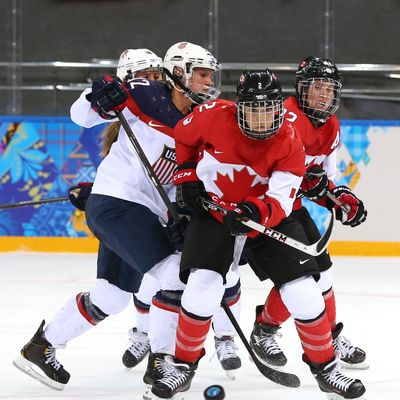
How much better are the United States and Canada in women’s hockey than every other country on the planet? Since women’s hockey became an Olympic sport in 1998, the countries have combined to win every gold medal and all but one silver. Since the women’s hockey World Championships were introduced in 1990, the tournament’s been staged 15 times, and the two countries have met in the finals every single time. They’re so dominant, in fact, that the structure of this year’s Olympic tournament was changed in an effort to cut down on the number of times the U.S. and Canada would blow out opponents en route to the gold-medal game. There are story lines aplenty in the men’s hockey tournament, and lots of great rivalries in other sports during these Sochi Games. But no rivalry is fiercer than the one between the U.S. and Canadian women’s hockey teams.
A little history: The first Olympic women’s hockey tournament took place in Nagano in 1998. Led by captain Cammi Granato, Team USA beat the favorite Canada in the gold-medal game. During the five-game opening round that year, the U.S. outscored its opponents 33-7, while Canada outscored its opponents 28-12. That dominance would continue through the next several Olympic Games: Canada would win gold in 2002, 2006, and 2010, with the U.S. winning silver in two of those tournaments. (The Americans took bronze in Turin in 2006 — the only time these two teams failed to meet in the finals in either of the two major international tournaments.) By the 2010 Games, the scores were even more one-sided: Both the U.S. and Canada played four games leading up to their gold-medal showdown; they outscored their opponents by a combined 86-4 in those games.
As you might imagine, with the two teams facing off so frequently with so much on the line, some bad blood has developed. The two teams played seven exhibition games in advance of the Sochi Games: Canada won the first three, and the U.S. the next four. More than one of those games included a fight, including a massive line brawl in December in which American Monique Lamoureax and some teammates jumped in after Monique’s twin sister, Jocelyne, was hit with an illegal body check. (Body-checking isn’t allowed in women’s hockey, though that doesn’t mean games don’t involve some level of contact.) Says American defenseman Megan Bozek on facing Canada: “You know that on that day, you’re trying to draw blood in the nicest way possible.”
Rather than have the U.S. and Canada as the top teams in two evenly divided groups in Sochi (which would have led to lots of blowout games), the top four teams this year were placed in one group, with all of them advancing automatically to the medal round, and the top two teams getting a bye to the semis. That meant that this year, the U.S. and Canada would meet in the preliminary round. “I would definitely say the rivalry with Canada is a nasty one,” says Kelli Stack, a forward on the U.S. team, in advance of today’s preliminary round game. “We don’t like them, plain and simple. We want to win that game no matter what – whatever it takes.”
That game, which aired live this morning because hockey fans won’t put up with the tape-delay nonsense NBC uses for other sports, was everything you’d hope for in an Olympic competition: Close, tense, and played at an extraordinarily high level. It also involved some controversy. Canada controlled play early, but the U.S. took a 1-0 lead late in the second period on a goal by Hilary Knight, her third goal and fifth point of the tournament. But the Canadians tied the game in the third, then took the lead on a controversial goal in which the puck appeared to enter the net after the referee had blown the play dead. (For what it’s worth, the whistle shouldn’t have blown, as it hadn’t been covered by U.S. goalie Jessie Vetter, but a bad whistle is a whistle nonetheless.)
That call proved critical: Canada dominated much of the third period, extending its lead to 3-1 on Megan Agosta’s second goal of the game, but the U.S. drew to within a goal after pulling Vetter late in the period. Then after Canada was whistled for having too many skaters on the ice (or as NBCSN’s Pierre McGuire consistently referred to it, “too many men”), the Americans were given a last-gasp power play, but couldn’t convert, losing 3-2.
Today’s game affects seeding for the medal round, but not much else: Both the U.S. and Canada got byes to the semifinals and will be on opposite sides of the bracket, meaning they’re on track to meet once again in the gold-medal game.
Says Team Canada goalie Charline Labonte: “We’re so passionate, this is our Stanley Cup, so I think we leave our emotions on the ice.”





























